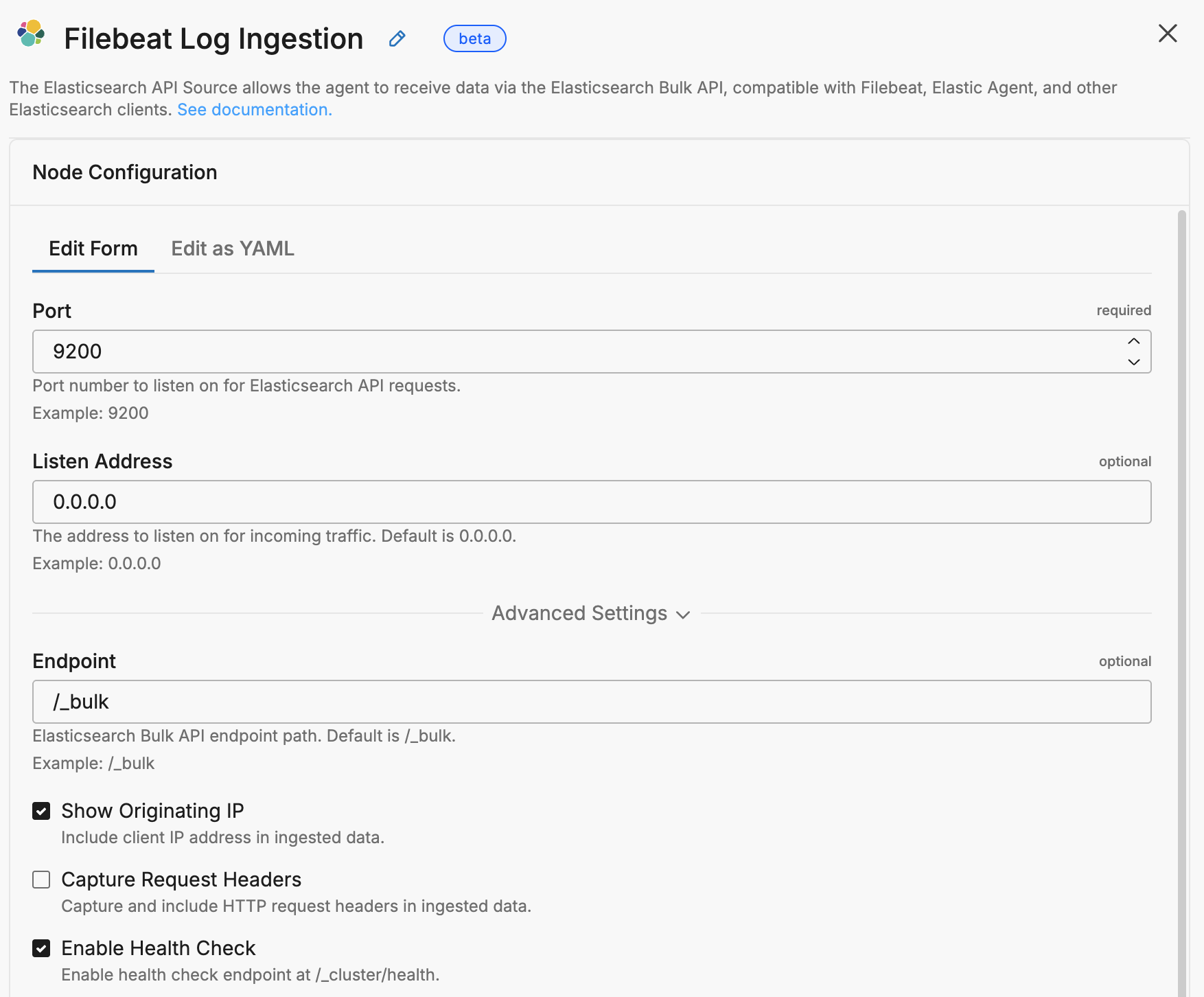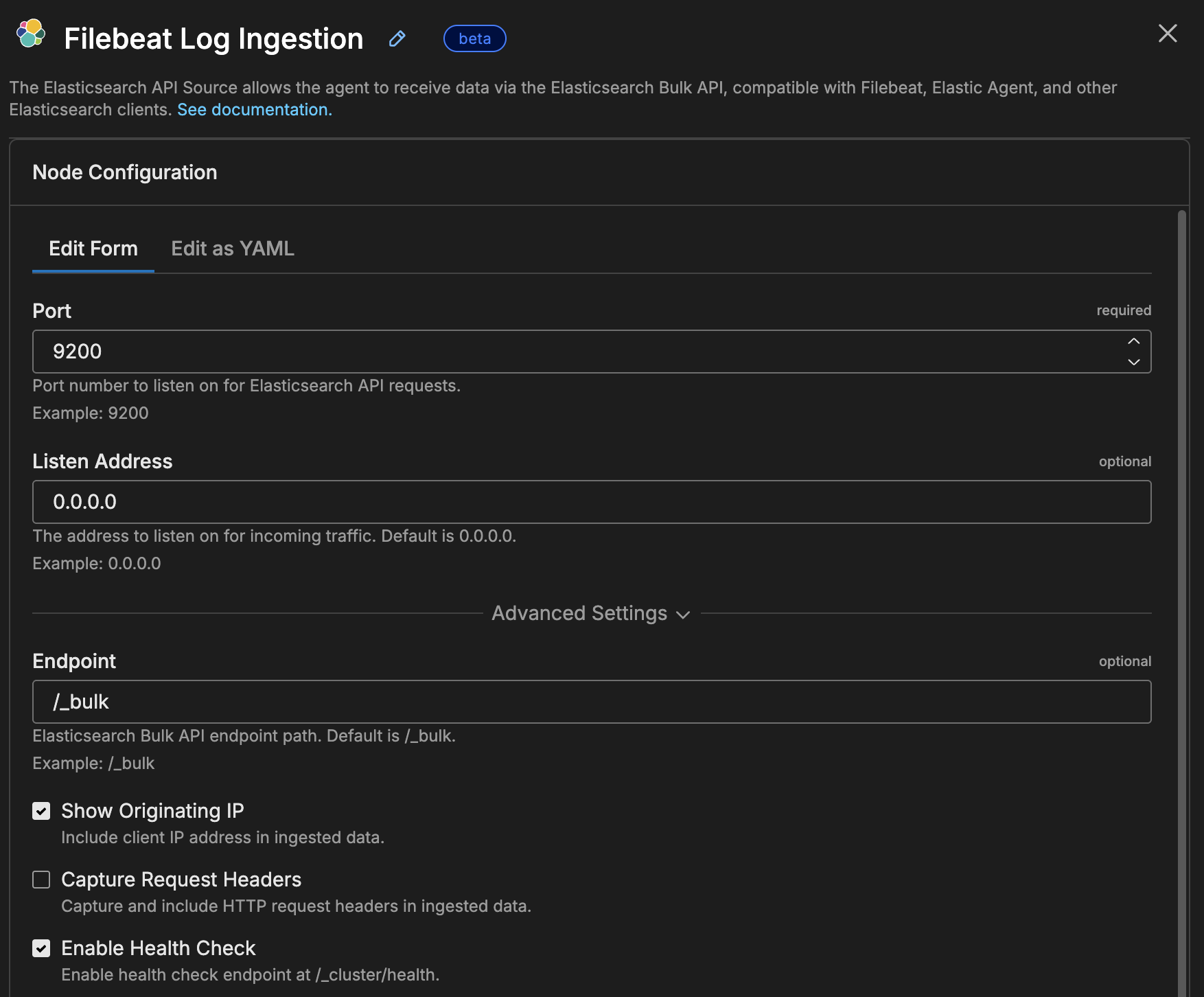Ingest Data from Elasticsearch Bulk API
7 minute read
Overview
The Elasticsearch API Input node enables Edge Delta to receive data from any tool that supports the Elasticsearch Bulk API protocol. This provides a seamless migration path from Elasticsearch-based collection pipelines and allows you to leverage existing Beats agents, Logstash pipelines, and other Elasticsearch-compatible data shippers without modification.
The node implements the Elasticsearch Bulk API (/_bulk endpoint) and responds with API version 8.3.2 compatibility, making it a drop-in replacement for data ingestion workflows.
Key Features
- Protocol Compatibility: Accepts Elasticsearch Bulk API requests in NDJSON format
- Zero Configuration Migration: Works with existing Filebeat, Logstash, and Vector configurations
- Kubernetes Native: Designed for containerized environments with service discovery
- Health Check Support: Built-in health endpoint for load balancer integration
- Metadata Preservation: Maintains source metadata including index names and document IDs
- High Performance: Configurable request limits and parallel processing
Common Use Cases
Use Case 1: Kubernetes Log Collection with Filebeat
This is the most common deployment pattern for collecting container logs in Kubernetes clusters using Filebeat DaemonSets.
Architecture Overview
Container Logs → Filebeat DaemonSet → Elasticsearch API Input → Edge Delta Pipeline → Destinations
In this pattern:
- Filebeat runs as a DaemonSet, collecting logs from all nodes
- Filebeat enriches logs with Kubernetes metadata
- Data is sent to Edge Delta via the Elasticsearch Bulk API
- Edge Delta processes and routes data to multiple destinations
Filebeat Configuration
Configure Filebeat to send logs to Edge Delta’s Elasticsearch API Input:
apiVersion: v1
kind: ConfigMap
metadata:
name: filebeat-config
namespace: monitoring
data:
filebeat.yml: |-
filebeat.inputs:
- type: container
paths:
- /var/log/containers/*.log
processors:
- add_kubernetes_metadata:
host: ${NODE_NAME}
matchers:
- logs_path:
logs_path: "/var/log/containers/"
- add_cloud_metadata: ~
- add_host_metadata: ~
# Output to Edge Delta Elasticsearch API
output.elasticsearch:
hosts: ["edgedelta.edgedelta.svc.cluster.local:9200"]
protocol: "http"
# Index name pattern (preserved in metadata)
index: "filebeat-%{+yyyy.MM.dd}"
# Bulk settings for optimal performance
bulk_max_size: 50
worker: 1
compression_level: 0
# Connection settings
timeout: 30
max_retries: 3
# Disable template management for non-Elasticsearch endpoints
setup.template.enabled: false
setup.ilm.enabled: false
# Logging configuration
logging.level: info
logging.to_stderr: true
logging.to_files: false
# Add custom fields
processors:
- add_fields:
target: ''
fields:
lab_name: production-cluster
source_tool: filebeat
deployment: kubernetes
Edge Delta Configuration
Add the Elasticsearch API Input node to your Edge Delta pipeline:


nodes:
# Elasticsearch API Input
- name: elasticsearch_api_input
type: elastic_api_input
user_description: "Filebeat Log Ingestion"
port: 9200
endpoint: "/_bulk"
listen: "0.0.0.0"
enable_health_check: true
active_request_limit: 256
api_version: "8.3.2"
Kubernetes Service Configuration
Create a Service to expose the Elasticsearch API Input:
apiVersion: v1
kind: Service
metadata:
name: edgedelta
namespace: edgedelta
labels:
app: edgedelta
spec:
selector:
app.kubernetes.io/name: edgedelta
edgedelta/agent-type: processor
ports:
- name: elastic-api
port: 9200
targetPort: 9200
protocol: TCP
type: ClusterIP
Data Flow and Metadata
When logs flow through this pipeline, they maintain rich metadata:
Original Log:
{"timestamp":"2025-10-27T07:20:43Z","sequence":228,"level":"WARN","user_id":9201,"action":"view_page","service":"web-app"}
After Filebeat Enrichment:
{
"message": "{\"timestamp\":\"2025-10-27T07:20:43Z\",\"sequence\":228,\"level\":\"WARN\"}",
"agent": {
"type": "filebeat",
"version": "8.11.0",
"hostname": "worker-node-1"
},
"kubernetes": {
"pod": {
"name": "app-pod-xyz",
"namespace": "production"
},
"container": {
"name": "app-container"
},
"labels": {
"app": "web-service",
"version": "v2.1.0"
}
},
"host": "worker-node-1",
"lab_name": "production-cluster",
"source_tool": "filebeat"
}
After Edge Delta Processing (Resource Attributes):
{
"ed.source.name": "elasticsearch_api_input",
"ed.source.type": "elastic_api_input",
"elastic.action": "create",
"elastic.index": "filebeat-2025.10.27",
"host.ip": "10.244.1.16",
"host.name": "worker-node-1",
"service.name": "elastic-api-9200"
}
Use Case 2: Multi-Source Log Aggregation with Logstash
Logstash can aggregate logs from multiple sources and forward them to Edge Delta for centralized processing.
Logstash Configuration
input {
# Collect from multiple sources
syslog {
port => 5514
}
tcp {
port => 5000
codec => json
}
}
filter {
# Add custom metadata
mutate {
add_field => {
"pipeline_source" => "logstash"
"environment" => "production"
}
}
}
output {
elasticsearch {
hosts => ["http://edgedelta.edgedelta.svc.cluster.local:9200"]
index => "logstash-%{+yyyy.MM.dd}"
# Disable template and ILM for Edge Delta compatibility
manage_template => false
ilm_enabled => false
}
}
Use Case 3: Vector as a Universal Data Collector
Vector can collect from various sources and forward to Edge Delta using the Elasticsearch sink.
Vector Configuration
[sources.kubernetes_logs]
type = "kubernetes_logs"
[sources.host_metrics]
type = "host_metrics"
[transforms.parse_logs]
type = "remap"
inputs = ["kubernetes_logs"]
source = '''
.application = "web-app"
.processed_by = "vector"
'''
[sinks.edgedelta]
type = "elasticsearch"
inputs = ["parse_logs", "host_metrics"]
endpoint = "http://edgedelta.edgedelta.svc.cluster.local:9200"
mode = "bulk"
# Batch settings
batch.max_bytes = 10485760
batch.timeout_secs = 5
# Disable template management
bulk.index = "vector-%Y.%m.%d"
api_version = "v8"
[sinks.edgedelta.request]
# Connection settings
timeout_secs = 30
Prerequisites
Before implementing the Elasticsearch API Input integration:
- Edge Delta Agent Version: v2.7.0 or higher
- Network Connectivity: Ensure data shippers can reach Edge Delta agents on port 9200
- Kubernetes Service (for K8s deployments): Create a Service to expose the Elasticsearch API endpoint
- Tool Configuration: Disable Elasticsearch template management in your data shippers
Verification and Testing
Test Connectivity
Test the health endpoint from within your cluster:
# Using curl
curl http://edgedelta.edgedelta.svc.cluster.local:9200/
# Expected response:
{
"cluster_name": "edgedelta",
"version": {
"number": "8.3.2",
"build_flavor": "default",
"build_type": "docker"
}
}
Send a Test Bulk Request
curl -X POST http://edgedelta.edgedelta.svc.cluster.local:9200/_bulk \
-H "Content-Type: application/x-ndjson" \
--data-binary $'{"index":{"_index":"test"}}\n{"message":"test log entry","timestamp":"2025-10-27T10:00:00Z"}\n'
Monitor Data Flow
Check Edge Delta logs to verify data reception:
kubectl logs -n edgedelta daemonset/edgedelta | grep elastic_api
# Expected output:
# elastic_api_input started HTTP server on 0.0.0.0:9200
# elastic_api_input received bulk request with X documents
Monitor your destination to confirm data delivery:
# Check your configured output destination
kubectl logs -n your-namespace deployment/your-destination
Troubleshooting
Common Issues and Solutions
Issue: “405 Method Not Allowed” on Template Operations
Symptoms: Filebeat or Logstash fails with template-related errors
Solution: The Elasticsearch API Input only implements the Bulk API, not the full Elasticsearch management API. Disable template management:
Filebeat:
setup.template.enabled: false
setup.ilm.enabled: false
Logstash:
output {
elasticsearch {
manage_template => false
ilm_enabled => false
}
}
Issue: “Connection Refused” or DNS Resolution Failures
Symptoms:
lookup edgedelta.edgedelta.svc.cluster.local: no such host
Solution: Ensure the Kubernetes Service is created to expose port 9200:
# Check if Service exists
kubectl get service edgedelta -n edgedelta
# Verify Service endpoints are populated
kubectl get endpoints edgedelta -n edgedelta
# Should show agent pod IPs on port 9200
If the Service doesn’t exist, create it with the correct selector matching your agent pods.
Issue: No Data Flowing Through Pipeline
Checklist:
Verify agent is listening:
kubectl logs -n edgedelta daemonset/edgedelta | grep "started HTTP server"Check Service DNS resolution:
kubectl run test --image=busybox --rm -it --restart=Never -- \ nslookup edgedelta.edgedelta.svc.cluster.localTest connectivity:
kubectl run test --image=curlimages/curl --rm -it --restart=Never -- \ curl -v http://edgedelta.edgedelta.svc.cluster.local:9200/Verify Filebeat configuration:
kubectl logs -n <filebeat-namespace> daemonset/filebeat | grep -i connectionCheck Edge Delta pipeline links: Ensure
elastic_api_inputis linked to a processor and output in your pipeline configuration
Issue: High Memory Usage on Edge Delta Agents
Symptoms: Agents consuming excessive memory with high log volume
Solution: Tune the active_request_limit parameter:
- name: elasticsearch_api_input
type: elastic_api_input
active_request_limit: 128 # Reduce from default 256
Also optimize Filebeat batch sizes:
output.elasticsearch:
bulk_max_size: 25 # Reduce from 50
worker: 1
Performance Tuning
Filebeat Optimization
For high-volume environments (>10,000 events/second per node):
output.elasticsearch:
# Increase batch size for better throughput
bulk_max_size: 100
# Add more workers
worker: 2
# Enable compression
compression_level: 3
# Adjust queue settings
queue.mem:
events: 8192
flush.min_events: 512
flush.timeout: 1s
Edge Delta Configuration
For handling high request rates:
- name: elasticsearch_api_input
type: elastic_api_input
active_request_limit: 512 # Increase for high throughput
port: 9200
channel_size: 2000 # Increase internal buffer (default 1000)
Security Considerations
Authentication
To enable authentication on the Elasticsearch API Input:
- name: elasticsearch_api_input
type: elastic_api_input
port: 9200
authentication:
type: basic
username: filebeat
password: ${FILEBEAT_PASSWORD}
Then configure Filebeat:
output.elasticsearch:
hosts: ["edgedelta.edgedelta.svc.cluster.local:9200"]
username: "filebeat"
password: "${FILEBEAT_PASSWORD}"
TLS Encryption
For secure transmission:
- name: elasticsearch_api_input
type: elastic_api_input
port: 9200
tls:
enabled: true
cert_file: /etc/certs/tls.crt
key_file: /etc/certs/tls.key
Update Filebeat configuration:
output.elasticsearch:
hosts: ["edgedelta.edgedelta.svc.cluster.local:9200"]
protocol: "https"
ssl.verification_mode: "certificate"
ssl.certificate_authorities: ["/etc/certs/ca.crt"]
Next Steps
- Review the Filebeat source reference for all configuration parameters
- Explore AI Team Filebeat connector for streamlined setup
- Learn about sequence processors to build processing chains
- Configure output destinations for your processed data